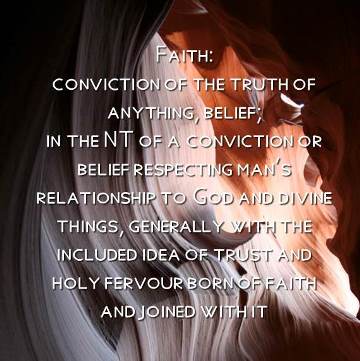COMPELLING TRUTH
Faith
Part 1: What is faith?
By Robin Schumacher

What is faith? In my blog post on how we can we can know that the story of Christ's resurrection is true, I received a couple of comments respectfully objecting to my evidentiary/philosophical approach to the matter. I thought I'd follow up with them in another blog entry vs. handling them in the typical comment/reply fashion.
Further, I wanted to address the comments of atheist Ryan Benson in his recent column on Patheos where he raised some good objections to Christians and others who wrote him in response to his challenge of explaining ‘faith'. I think Ryan's column serves as a good response to those who protested my approach to the resurrection and why we need to say more to people than ‘just believe'.
Is faith, as one of my blog commenters put it, something that you just know that you know that you know? And regarding the need to bridge the gap between the historical aspects of Christianity and the faith that Christians hold – is that important or not? At least one person didn't think so.
But it is important. And it's also essential that we have a right handle on what ‘faith' actually is where the Bible uses the term. If we don't, we can't intelligently answer people like Mr. Benson and others who ask us to define what faith is and why they should embrace our position that Christianity is true.
What is Faith? Getting Started
A number of years ago, James Sire wrote an excellent book and held a series of seminars on college campuses that were both entitled "Why Should Anyone Believe Anything at All?"That's a very good question.
I think I have a good answer to the question. The reason to believe something – the only reason to believe something – is because that ‘something' is true.
Anyone disagree? I hope not.
If atheism is true, then we all need to be atheists. If Muhammad truly is God's last prophet and the Qur'an represents the true word of God then we all need to be Muslims. And if Christ really did rise from the dead and His words were faithfully recorded by the New Testament writers then we all need to be Christians.
Truth matters in every area of life – medical, business, personal relationships, take your pick. And so it stands to reason that truth is the only thing that ultimately matters in the spiritual realm too.
Why? Well, for a couple of reasons. First, without truth in religion how can something like the Mormon's "burning in the bosom" (which they say tells them something is right and true, such as Joseph Smith was a prophet from God) ever be challenged or falsified? But with facts and history, we have something to work with. For example, if a Mormon gets a burning in the bosom telling them the Book of Mormon was given to Joseph Smith by God, we can show them how Smith plagiarized almost entire chapters of the 1611 King James Bible (including the words added by the translators) and demonstrate to them that he was a fraud.
Second, truth matters in life simply because consequences exist for being wrong. The Apostle Paul understood this fact all too well. This is why in his famous defense of Christ's resurrection recorded in 1 Corinthians 15, he said: "For if the dead are not raised, not even Christ has been raised; and if Christ has not been raised, your faith is worthless; you are still in your sins. Then those also who have fallen asleep in Christ have perished. If we have hoped in Christ in this life only, we are of all men most to be pitied" (1 Cor. 15:16-19, emphasis added).
If you call yourself a Christian, do you understand that you are most to be pitied among everyone else on the planet if Christ wasn't raised from the dead – in other words, if Christianity isn't true? There are sad consequences that come from being a Christian if Christianity isn't real, so says the most eminent apostle of Christ. This being the case, we see that truth should be the bedrock and foundation of all faith, which is perhaps why the Hebrew term for truth ("emeth") literally means "firmness and duration"; that is to say, an everlasting substance.
I appreciate Ryan Benson's correct statement in his column about how a disregard for the firm foundation of truth causes religious people to turn a deaf ear to the radical differences and beliefs in opposing faiths. In our pluralistic culture where it's fine to say "this is right" as long as it's not followed up with "and therefore that is wrong", it's good to see someone call attention to the importance of the law of non-contradiction. It's also a biblical stance. The Apostle Paul made use of all the core principles of logic such as the law of identity (e.g. 2 Cor. 11:4), non-contradiction (e.g. 1 Cor. 10:21), excluded middle (e.g. 1 Cor. 8:5-6), and rational inference (e.g. 1 Cor. 15:16-17) in making his case for the gospel.
What happens when you take an approach to religion/spirituality where a concern for the truth is secondary? That's easy – you'll gravitate to something that's pleasing to you. Pascal puts in like this: "People almost invariably arrive at their beliefs not on the basis of proof [truth] but on the basis of what they find attractive."
Next: Part 2: Defining faith
Faith, The Series
Part 1: What is faith?
Part 2: Defining faith
Part 3: Faith that and faith in — an important distinction
Part 4: What it takes to have faith
Part 5: The biblical concept of faith
Image Credit: Jean Edmonds
comments powered by Disqus
Reposted 5-20-13

